School Librarian Certifications
School Librarians with MLS or MLIS degrees may need further professional certifications in their career
Post-Graduate Certifications You May Need
A career as a school librarian requires a blend of advanced education and specific certifications to meet state and national standards. School librarians, often referred to as library media specialists, play a crucial role in K-12 education by fostering literacy, teaching research skills, and managing library resources. While earning an MLS or MLIS degree is the foundation for this career, additional certifications are often required to ensure librarians meet educational and professional standards.
Many states require school librarians to hold certifications beyond their MLS or MLIS degree. These certifications validate that you have the specific skills and knowledge necessary to work with students, teachers, and administrators in a school environment. Requirements vary by state, but common certifications include:
- School Library Media Specialist Certification: A state-specific certification that often requires passing exams such as the PRAXIS II Library Media Specialist test and completing coursework in educational technology, curriculum design, and literacy.
- Teaching Certification: In many states, school librarians must also be certified teachers. This may require completing additional teacher education coursework and student teaching hours.
- Library Media Endorsements: Some states offer endorsements that can be added to an existing teaching license, allowing educators to work as school librarians without completing a full MLS degree.
Obtaining these certifications ensures you meet the legal requirements for employment and demonstrates your commitment to supporting students’ learning and development.
Ongoing Education for MLS and MLIS Graduates
The field of library science is constantly evolving, especially in schools where technology integration and new teaching strategies are critical. To stay current, school librarians must participate in ongoing professional development, which often includes:
- State-Mandated Professional Development: Many states require certified school librarians to complete continuing education credits or professional development hours to maintain their certification.
- Workshops and Conferences: Events such as those hosted by the American Library Association (ALA) or the American Association of School Librarians (AASL) provide opportunities to learn about emerging trends and best practices.
- Advanced Certifications: Some professionals choose to pursue specialized certifications in areas like digital literacy, leadership in education, or advanced cataloging to enhance their skills and career prospects.
These ongoing education requirements ensure that school librarians remain effective in supporting students and teachers in a rapidly changing educational environment.

Types of School Librarian Certifications
State-Specific Library Media Specialist Certification
Each state has its own certification process, often requiring coursework in library media services, child development, and teaching strategies. Most states also require candidates to pass exams, such as the PRAXIS II Library Media Specialist test, and complete internships or fieldwork in a school library setting.
National Board Certification for School Librarians
The National Board for Professional Teaching Standards (NBPTS) offers an advanced certification specifically for library media specialists. This certification demonstrates exceptional competence and leadership in the field and is highly regarded across the U.S.
Teaching Licenses with Library Endorsements
For individuals already certified as teachers, many states offer endorsements that allow you to add library media services to your teaching license. This is often a more streamlined path for educators transitioning into school librarianship.
Technology and Digital Literacy Certifications
In today’s digital-first learning environments, additional certifications in technology integration and digital literacy are increasingly valuable. Programs like Google for Education certifications or AASL digital literacy badges help school librarians stay competitive and relevant.
Specialized Certifications
Some states and institutions offer certifications focused on specific skills or populations, such as:
- Early Literacy Certification: For librarians specializing in Pre-K to elementary education.
- STEM Integration Endorsements: For those incorporating science, technology, engineering, and math into library programming.
The Importance of Certifications for School Librarians
Earning and maintaining the right certifications ensures school librarians can effectively support student achievement and contribute to their school communities. Certifications validate your expertise, keep you competitive in the job market, and often lead to higher earning potential.
By understanding the types of certifications available and staying current with professional development, school librarians can thrive in a career that combines education, literacy, and technology. If you’re ready to pursue a career as a certified school librarian, start exploring the specific requirements in your state today.

